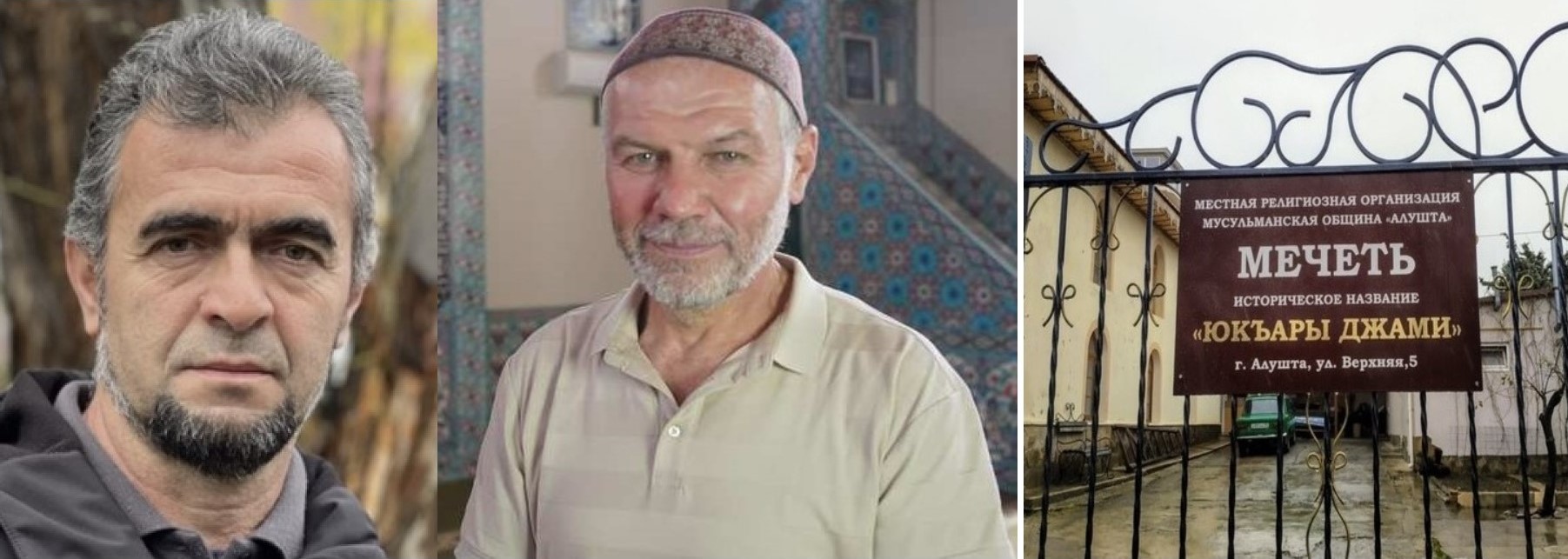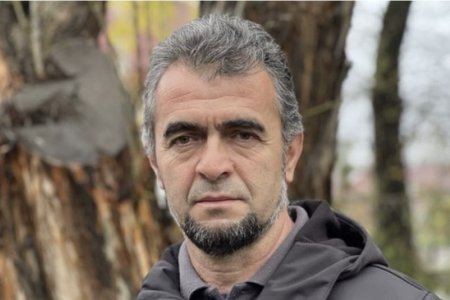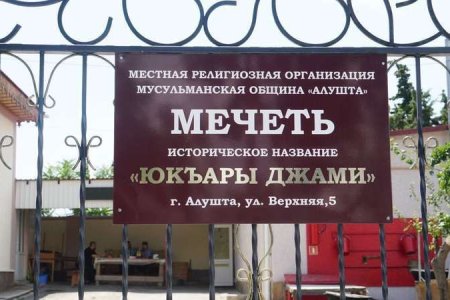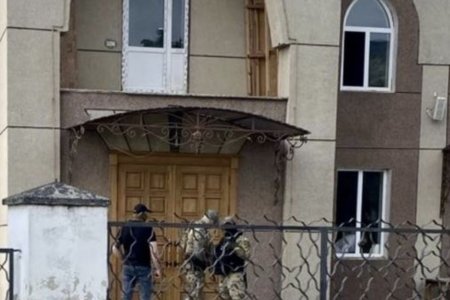
Russia’s notorious ‘centre for countering extremism’ carried out armed raids of several Crimean Tatar families in November and December 2023, targeting the Imams and other men linked to two independent Muslim communities in occupied Crimea. Although preposterous pretexts were found for briefly imprisoning three men, including Yusuf Ashirov, Imam of the ‘Alushta’ Muslim community, more serious, though no less absurd, charges were also laid, with these the subject of occupation ‘court’ rulings on 19 and 21 February.
The first ruling from the Russian-controlled ‘Crimean high court’, unfortunately, came as no surprise, with the appeal against a huge 100 thousand rouble fine imposed upon the ‘Alushta’ Muslim Community rejected. The fine, earlier imposed by the occupation ‘Alushta municipal court’, was over the alleged keeping of books written by Islamic theologians in the mosque. Lawyer Rustem Kyamilev acknowledged that no one had had any illusions about the outcome of the hearing on 21 February, for all its baselessness. “The non-profit organization which has existed in this place since 1994 will pay the fine, although all local residents know the community and its Imam, its head and other members and know that these people have never called to any kind of extremism”. He stressed that all had carried out their activities in accordance with the law, and said that they would be lodging an appeal against the ruling.
The so-called ‘Centre for countering extremism’ had claimed that the ‘Alushta’ community had “permitted the retention of extremist material which are on the relevant federal list.” They claimed, moreover, that the books had been intended for mass circulation. The list of books, etc., that Russia has prohibited as ‘extremist’ is huge and includes numerous books on Holodomor, Ukrainian history, as well as religious books such as the four that the ‘anti-extremism squad’ focused on in this case. Kyamilev points out that the protocol on administrative charges was only drawn up on 30 November 2023, a week after the armed search in the mosque when enforcement officers removed some books. Some of the books on the protocol were, in fact, removed on 30 November during a search of the home of the head of ‘Alushta’, Abdul Gafarov, and had never been in the mosque and, therefore, never “intended for mass circulation”. That did not prevent the administrative charge of ‘mass circulation of extremist material’ and 100-thousand rouble fine which the Russian-controlled ‘high court’ has now upheld.
As reported, the families of three Crimean Tatars linked with ‘Alushta’ were subjected to armed searches on 23 November 2023, with Imam Yusuf Ashirov; Zinur Appazov and Villen Useinov all jailed, on nonsensical charges, for two, five and ten days, respectively.
While all of the charges were absurd, the one against Ashirov, as well as the reason for it, were especially cynical. It was claimed that the Imam had used foul language, which a protocol was being drawn up against him under Article 5.26 (infringing legislation on freedom of conscience and religious organizations), or so-called ‘illegal missionary activities’. Kyamilev reported that one of the officers had tried to get Ashirov to agree to speak in the mosque the following day in support of the Mufti of Crimea (who in 2014 chose collaboration with the Russian occupation regime). The officer had also told him that somebody else would be leading Friday prayers. Ashirov had refused to collaborate in this way, hence the charge of supposed ‘petty hooliganism’.
According to Ashirov’s lawyer, Nazim Sheikhmambetov, the armed raids and detentions were deliberately timed to take place on Thursday, so that, if Ashirov did not ‘cooperate’, the enforcement officers could foist another imam on to the ‘Alushta’ community.
This, in fact, aroused anger among the members of the community. The latter has been under attack since soon after Russia’s invasion and annexation of Crimea. This is both because of its religious independence, which the Russian-collaborating ‘Directorate of Muslims of Crimea’ under Emirali Ablayev, want to crush, and because of the wish to seize the 19th Century Yukary Dzhami Mosque in the very centre of Alushta which had legally been in the hands of the ‘Alushta’ community since 1994. In 2017, the occupation regime revoked the community’s ownership with Russian-controlled or Russian courts, right up to the Supreme Court upholding this illegal ruling.
Yusuf Ashirov has been Imam at the Mosque since 1994 and has been repeatedly re-elected by the community. Under Russian occupation, however, he had already suffered persecution, including under the bizarre charge of ‘carrying out unlawful missionary activities’ for his role as Imam of his own religious community and mosque (Article 5,26 § 4 of Russia’s code of administrative offences,.
The earlier ‘conviction’ on this charge meant that the decision on 21 February by Alushta ‘magistrate’ Yana Bykova to terminate the case against Yusuf Ashirov for supposed ‘unlawful missionary activities’ was both welcome, and unexpected. Bykova found no elements of an offence in the Imam’s actions.
According to Sheikhmambetov, “Ashirov has for decades fulfilled his civic duty before the Muslim members of the community Over 200 people signed an appeal, stating that the Imam had always held services, Friday prayer and other collective worship. This was also confirmed by witnesses questioned in court. He has carried out this duty from the point of view of his religion and his responsibility to society. The court agreed with these arguments.”
Ashirov himself is adamant that the prosecutions he is facing are part of the attempt to seize control of the mosque. The methods used in this offensive against ‘Alushta’ have not been confined to administrative charges. Three Crimean Tatar political prisoners are currently serving horrifically long sentences on grotesque charges. While those against Muslim Aliev, who is also an Amnesty International prisoner of conscience, may have targeted him because of his personal religious ‘dissidence’, the later arrests of the then head of the ‘Alushta’ community Lenur Khalilov and an active member of the community, Ruslan Mesutov, were closely linked in time with the moves to seize the Yukary Dzhami Mosque.
The termination of Ashirov’s charges came two days after the occupation ‘Kirovske district court’ allowed the appeal lodged by another Imam, Ismail Yurdamov, over his conviction and fine, imposed on 12 January by the ‘Kriovske magistrate’s court’, for supposedly unlawful missionary activities On 19 February, ‘judge’ Georgy Tsertsvadze revoked the ruling and removed the charges. Yurdamov also explained during the hearing that he had, at the request of other Muslims in Privitne and the current Image, carried out religious ceremonies over many years. He said that the Imam had often delegated his role due to his age and health issues.
As reported, Ismail Yurdamov’s was one of two Crimean Tatar families to be subjected to armed searches early on 13 December 2023. Although the charges against Yurdamov were ostensibly over his leading of Friday prayers, his daughter believed that he had been targeted for the active support he has shown for Russia’s large and mounting number of Crimean Tatar political prisoners.



